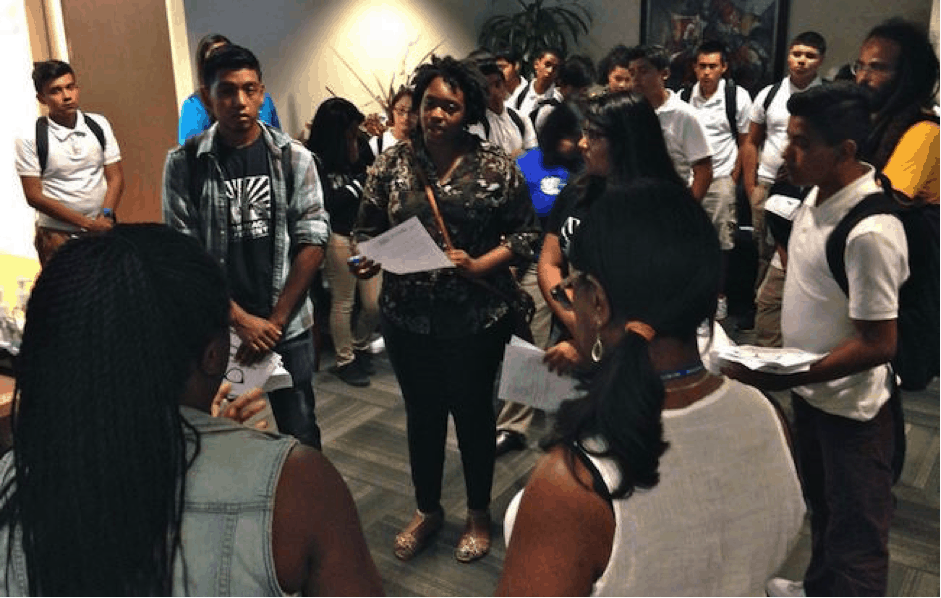
Octavia Moore, 16, holding paper at center, says Oakland, CA affiliate Genesis helped her find her voice. Her work on the group’s campaign to win free public transit for students to go to and from school has led to work to end the school to prison pipeline in Oakland schools and a deeper approach to structural racism.
What is your current involvement with Gamaliel?
My role as a youth leader in Genesis is to educate the public about running issues in society in addition to leading demonstrations and connecting the public to our commissioners and powerful groups. My goal this year before I go to college is to train and help other youth in my community realize their potential and become powerful forces in society.
How did you get involved originally?
When I was in seventh grade, a church friend connected me to Genesis’ lead organizer Mary Lim-Lampe, who was looking for a youth to share experiences and views on public transportation. I used to be very shy, timid and wouldn’t really speak in class but Mary helped me embrace my voice and personal experiences.
I had to learn to be comfortable with talking and presenting. I was the only youth representative in most of the meetings I attended, and it took me a while to realize that if I never showed up to these meetings and spoke up at them, they would have never heard from a youth even though they were making decisions that would impact people my age and generation.
What are some of your recent accomplishments?
In 2014 we won a ballot initiative campaign to fund a Free Youth Bus Pass for Alameda County youth going to school. In November, at Genesis’ Issues Assembly, my group brought the school-to-prison pipeline issue, which our entire leadership voted to address. We chose this because we saw that youth of color are not treated equally or fairly especially when it comes to our education and justice systems.
How do you want people to view you as a leader?
I want people to see me as loving and humble. Not as a perfect or typical leader, but as someone who strives to make their community better and safer.
I want a community where there are opportunities for all, not just the few. My goal as a leader is to allow people to see the light and humanity within each other and within themselves.
As a youth, I felt like because of my age I didn’t have the power or influence to make change within my community. But soon without realizing it I was doing the exact thing all my life I was taught I couldn’t do.
The reason I started my work on structural racism is because I saw how racism had impacted me. I saw people in my community were blocked from opportunities because of the color of our skin, and realized that I had become so normalized into my community that I didn’t recognize this as structural racism but just how things were.
With a world that is consumed by the images and ideas of modern society we can lose focus of our own inner beauty. If we allowed ourselves to see the light within each other we would make policies and decisions that benefitted our communities as a whole, instead of policies and decisions that only benefit a specific group of people. Cornel West said, ”Justice is what love looks like in public.”
Can you talk about how your faith has inspired your leadership position?
I attend First Congregational Church of Oakland and have been attending this church ever since I was 8 years old. One thing that First Congregational has is community and the ability to bring together community in Oakland. At First Congregational I found where I fit in in my community and where I make change.